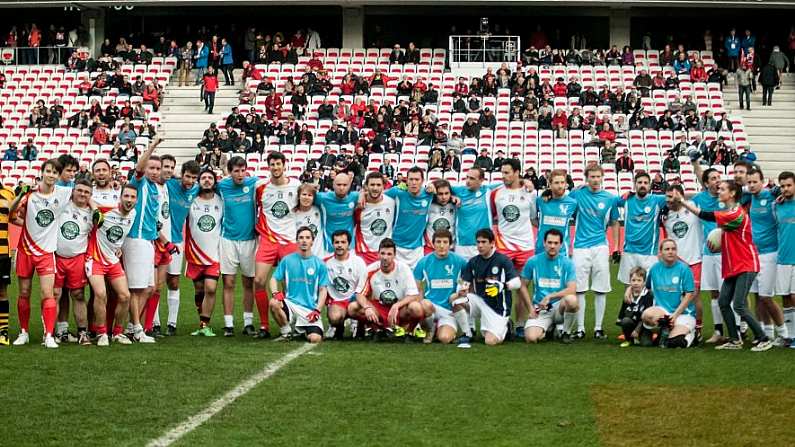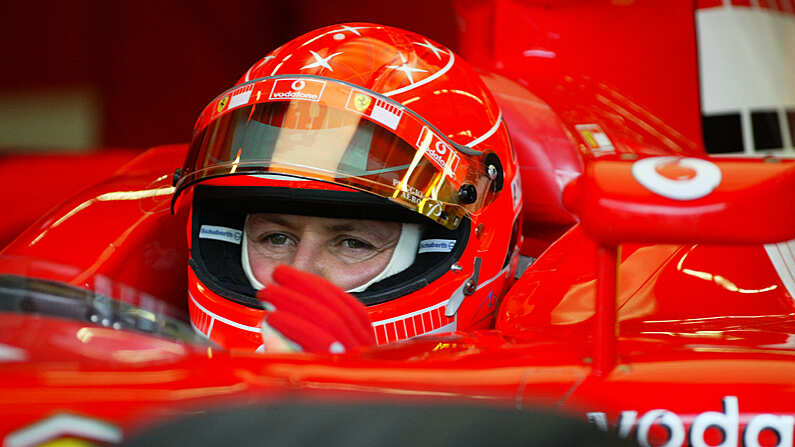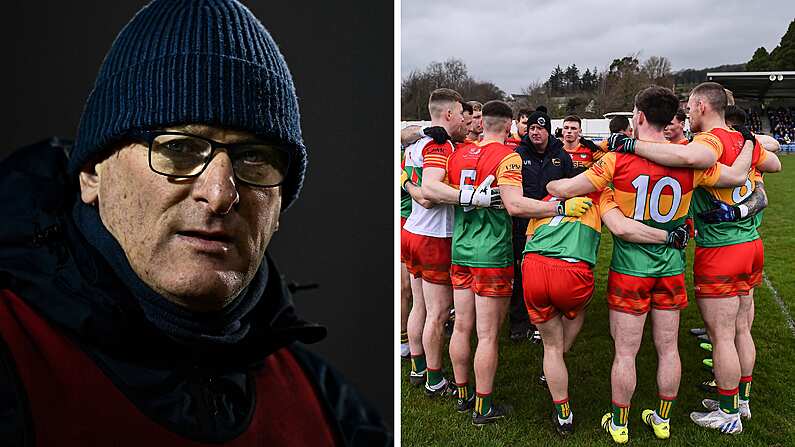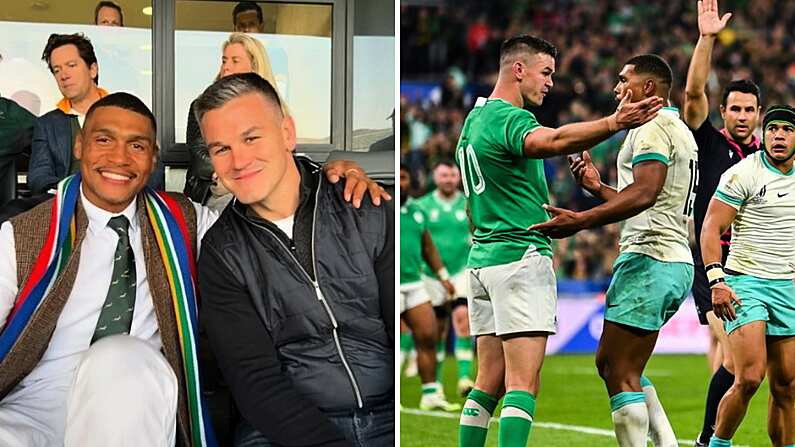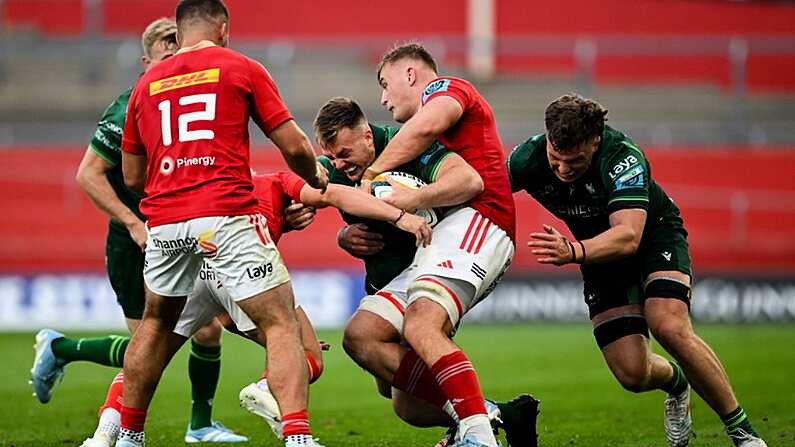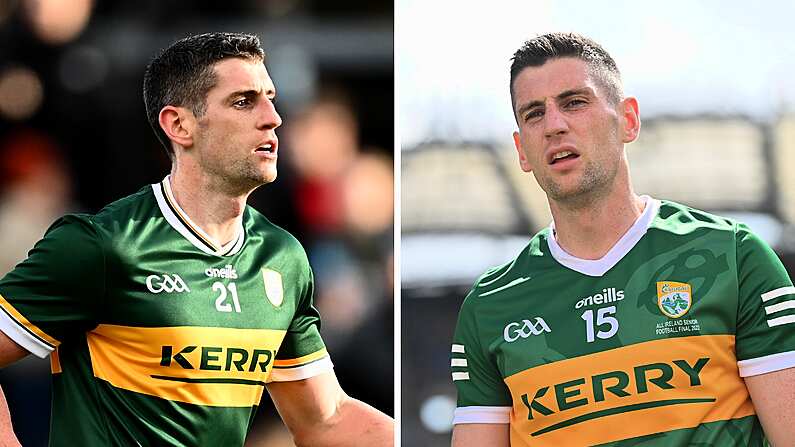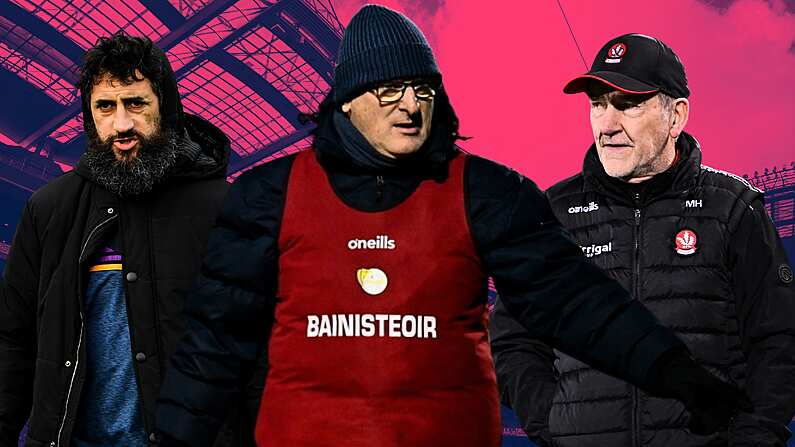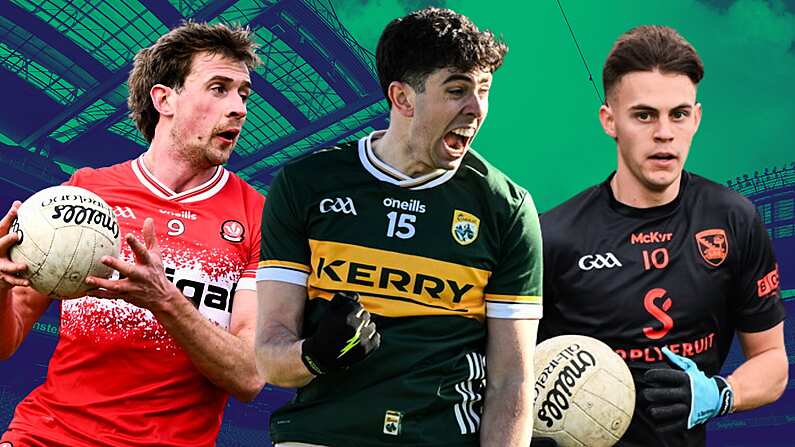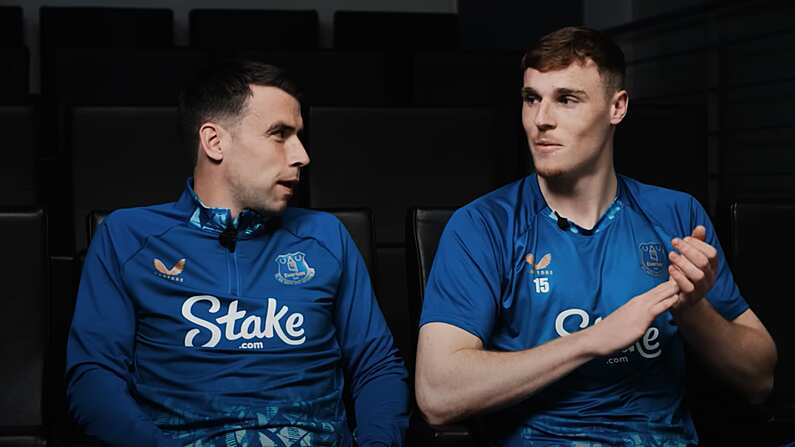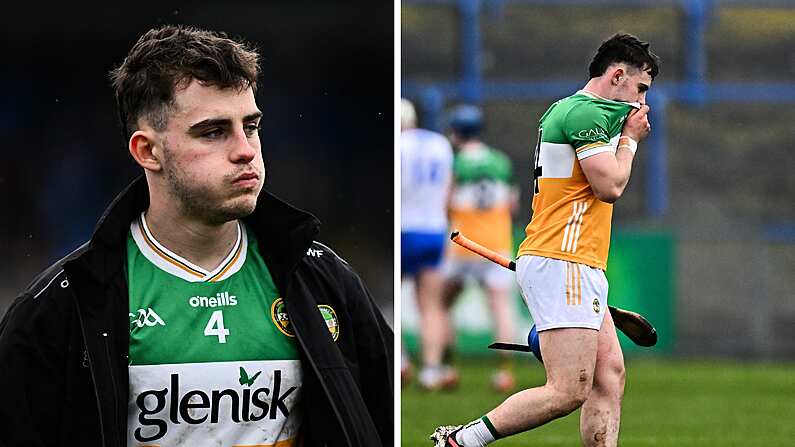If Ireland's greatest export is her people, perhaps her second greatest is her games.
Last week, Azur Gaels played Gaelic Football Provence in an exhibition Gaelic football game ahead of the Toulon/Stade Francais rugby game in the Top 14 and was covered by the largest sports broadcaster in France, Canal+.
Four months beforehand, two men with no Irish connection - Chard Faul and Charley Cornillau - met in a pub on the French Riviera and, out of a love of Gaelic Football, founded Azur Gaels.
To go from bar to broadcast in the space of four months is a remarkable rise. To find out how it was achieved, Balls.ie spoke to some of those involved.
Chard Faul is the chairman and co-founder of Azur Gaels. Chard Faul is English. He was born in Reading, and became enthralled by soccer from the age of six. Ironically, it was a love of soccer which helped take him to France. Faul is an Arsenal fan, and carries a panini sticker of Arsene Wenger in his wallet, so is unsurprised he has ended up in France.
With no Irish connection whatsoever, Faul discovered Gaelic Football when he moved to Toulouse in 2011:
I moved to Toulouse in December 2011 to become a translator. An English colleague of mine, Danny, told me about Gaelic football. I’d never heard of it. He was playing for the Toulouse team. After two straight years of badgering, I finally gave in to his recruitment attempts and came down to train.
My first and last full season with Toulouse was an absolute dream. To my surprise I became a regular starter, committee member and All-France winner, scoring two points in the final. It was magical, the best feeling I’ve had from any sport.
Faul found his skills at soccer, rugby and volleyball transferred well to the sport, and found the sport to be an ideal fusion of " technique, physicality and spirit, which makes it extremely satisfying to play".
Faul then left Toulouse to take a job on the Riviera, but he couldn't leave Gaelic football behind:
Right after winning the All-France with Toulouse I took a job near Nice on the South coast to be with my other love! The nearest club was GF Provence, a good two-hour drive away. After everything that had happened with Toulouse, I couldn’t just stop playing.
It was then that I got a message from Charley Cornillau, an ex-Nantes GAA man who had arrived a few months before me, asking whether I’d like to practise with him. We met in a pub in Antibes and pretty quickly started talking about finding other players to start a new club.
Charley and I wanted to reach out to the whole of the Côte d’Azur region, as there are loads of towns with good facilities and tons of people playing sport here.
And, incidentally, a large population of Irish expatriates. In addition, we were going to be representing the region, as the only GAA club. So we kept ‘Azur’, and went with ‘Gaels’ to add some authenticity.
Thus, Azur Gaels was born.
***
Chard sought players via a newspaper advertisement, and within a couple of months, the club had recruited 29 players, and the instant demand surprised Chaud:
What I found remarkable was when other people, mostly total beginners, put their faith in us and came along to training for the first time. And when we started to get sponsorship offers. And the sudden demand to run kids sessions!
Then the invitation, just three months in, from Toulon rugby club to play at the Allianz Riviera stadium before their Top 14 match against Stade Français… We ended up on Canal+ sport, the main French sports channel, for 10 glorious seconds. For me, that was remarkable.
#GaelicFootballProvence vs #AzurGaels , 10 secondes de gloire sur #Canal #RCTSFP #GAA #AllianzRiviera pic.twitter.com/7nAR2fSCTN
— GF Provence (@GfcProvence) February 1, 2016
Consistent with the club's founding fathers, the playing group is diverse. Of the 29 registered with the club, eight are Irish, two are English, one is Belgian and the rest are French. Among the Irish playing with the club is Micheál Pierse.
Pierse is a native of Listowel, and played up to under 16 level with Listowel Emmets before dropping out of the game, a decision he regrets. Pierse then moved to Australia in 2009. He also played with St Michael's College in Listowel, where he played alongside Noel Kennelly, a claim to fame which, Pierse says, is quite common: "I did play on the same team as Noel Kennelly at school but in Listowel, everyone’s claim to fame is playing with one of the Kennelly brothers when we were small".
Years later, Pierse moved to Australia, and would frequently watch Noel's brother: "Years later when I lived in Sydney, I used to watch Tadhg play at Sydney Swans. Everywhere I go in the world, I still tell his story of how he left a million dollars behind to play for Kerry.".
Pierse is a mariner by trade, and in 2009 moved from Australia to Nice in order to be closer to home. Direct flights from Shannon and Nice allow him, in his own words, to "have lunch in Nice and have dinner in Listowel".
Pierse resurrected his love of Gaelic football abroad, and in September 2015 answered the ad Faul took out in the paper.
The Listowel native was the first Irish player to join the squad, and -along with the club's founders - one of just three English speakers. Going from playing underage football in a county as steeped in tradition as Kerry to a newly founded club in France is a considerable culture shock, and Pierse is illuminating on the subject.
Whereas motivation for many GAA players come from representing one's small parish against a neighbour, this was not the case in France, where Azur's closest rivals were more than a hundred kilometres away:
Our first game was in December. I was the only Irish player so the tradition levels couldn’t be more different. Chard and I were the only two guys that spoke English as a first language that day. We were four nationalities represented. The French guys are from all over France, including Charley Cornillau from Nantes. Only he, Chard and I had ever played a game of Gaelic football before that day.
Giving the captain’s talk would be different to back home. If you think of the program Killinascully on television, their huge rivalry is against the 'bally boys' up the road. They are the sworn enemies of the village of Killinascully. There is a reason why that's in there in the program as it’s part of how the GAA exist.
The desperate local rivalry with the team from the next parish. It’s alive and well up and down the country back home. Our nearest team is 150 kms away. It’s hard to start a talk with "they have been coming down here for years' blagaurding us and think that they can come to our parish and push us around… What will the relations think of ye today and watching if ye are being pushed around." Obviously none of the 'pride of the parish' stuff is going to wash.
All of the training is done through French, although that hasn't prevented some of the turns of phrase unique to the GAA being introduced to widespread bemusement:
In the first game we had, I could see that one of the French lads didn’t get stuck in. I said to him in English, "you clown, you should have gone down on the dirty ball after it broke”… The reply I got was "but Micheál, the ball is perfectly fine and it’s not dirty!"
Pierse describes himself as having a Kerry accent, but says it does not appear anywhere on the"Healey-Rae"scale. In spite of that, some have struggled to grasp the most unique of all words to the GAA:
I was playing in defence and the ball came in and went everywhere and there was a bit of shoving going on and the decision went against us. I remonstrated with the ref saying "it was a harmless little schmozzle"... The ref looked at me in a strange way as if to say "what are you going on about"... I let it go… The ref was from Argentina... Who was I trying to fool?
***
While Pierse had the game and had to adapt to a new environment, Alexandre Chatelier had to try and assimilate to the game immediately. Whilst his soccer skills have helped him to master the solo relatively quickly, he says the pick-up has been the most difficult skill to assimilate.
Given the fact that Gaelic football utilises both hand and foot to a further extent than most sports, the co-ordination required to do this surprised Chatelier:
I was also not used to using my hands and my feet. Coordinating both wasn’t an easy thing. I still hesitate which part of the body I should be using to pass the ball in certain circumstances. The fact that there is no offside during the games was also strange in the beginning. It still is.
Despite initial struggles, Chatelier is a talented half-forward, and is described by Faul as one of the club's most talented players.
***
Chatelier played in the exhibition game at the Allianz stadium alongside Suzanne McElhinney. McElhinney is the club's Youth Officer and was the only female to play in that game. She played with Oliver Plunkett's and the Dublin ladies up until 2003, whereupon she departed for France:
Representing not only your club, but Gaelic football as well and on such a huge platform was an amazing experience. As the only female player there was of course an additional pressure to perform well, but also a great sense of pride to be the first and only female GAA player to play at the Allianz Stadium. I hope this is short lived however as I'd love to play in the first all-female game there in the not too distant future. Next time I'll get some pink boots as well.
According to Pierse, McElhinney has little problem fitting into the playing squad:
She and I never met until a training game and the first ball that came to me I got an awful wallop of a shoulder from her. The French fellas then knew that it was ok to shoulder hard when they saw Suzanne ploughing into me.
As I peeled myself up off the ground all I could hear was Suzanne’s young fella Oisín shouting on the sideline "Yeeeaaahhhh Mum". We joked about it afterwards. I keep saying she was extra hard on me as I was wearing a Kerry Jersey.
***
GAA arrived in France in 1994 with the foundation of Paris Gaels. There are 22 clubs in France, and are split in two leagues. One is in Brittany, where clubs are close enough to play individual matches. The rest of the clubs compete in monthly tournaments owing to the unfeasibly large commutes between clubs. The two divisions compete against each other at the end of the season, for elite, intermediary and foundation prizes depending on league placements.
Faul expects Gaelic football to continue to spread across France. France is the only European country with its own Gaelic football federation, and with communication and guidance for clubs getting better every year. Faul expects more clubs to be founded in the same way as Azur Gaels. Gaels itself will continue to grow, with Youth Officer McElhinney working on opportunities to present Gaelic football in schools across the French Riviera, and the club has been contacted by other youth teams in neighbouring European countries to work on promotion and exchanges.
For Faul, the next step is recognition for his club in Ireland. Along with plans being made to officially twin with Pierse's local club Listowel Emmets, Faul has one clear vision for Azur Gaels:
My real dream is to see the Azur Gaels club crest on the GAA Club Wall. To see that, and to feel that our club has made a tiny contribution to the sport as a whole, would be massive for me.
Such has been the progress in the club's first four months in existence, you would expect that to happen sooner rather than later. And even if the club does not make the GAA wall, it is fair to say that in the space of sixteen weeks, that contribution to the sport Faul seeks has already been made.
See Also: Revel In This Inspiring, Charming Message A Kerry Man Sent To Beaten Mayo Club

